The Hill’s Morning Report — Presented by PhRMA — What does Trump’s rising job approval mean for the midterms?
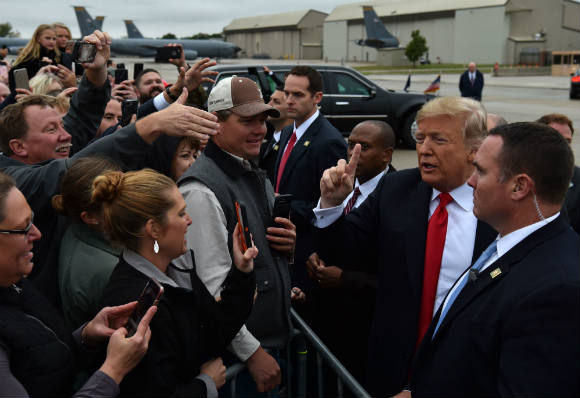
Welcome to The Hill’s Morning Report and it’s Wednesday! Our daily email gets you up to speed on the most important developments in politics and policy, plus trends to watch, co-created by Jonathan Easley and Alexis Simendinger. (CLICK HERE to subscribe!) On Twitter, find us at @joneasley and @asimendinger.
Hill.TV’s “Rising” program, starting at 8 a.m., features Cook Political Report national editor Amy Walter, talking about the outlook for the Nov. 6 elections; New Yorker contributor Robin Wright, about Saudi Arabia and Jamal Khashoggi’s death; New York Times chief White House correspondent Peter Baker; and Rep. Ted Lieu (D-Calif.). http://digital-staging.thehill.com/hilltv
****
President Trump is enjoying a small jolt upward in popularity ahead of the midterm elections, although it likely won’t be enough on its own to keep Democrats from taking over the House.
A Gallup survey released on Tuesday found the president’s job approval rating jumped 6 points to 44 percent. Trump’s numbers in that poll have trended steadily upward since September, when the battle over the confirmation of Supreme Court Justice Brett Kavanaugh was in full swing.
And an NBC News/Wall Street Journal survey released earlier this week put the president at 47 percent approve and 49 percent disapprove among polled registered voters, his highest marks to date.
All told, Trump sits at 44.3 percent approval in the RealClearPolitics average of surveys, more negative than positive but posting his best rating since June.
It’s good news for Republicans that Trump won’t be the anchor on the party that he might have been if his numbers were still mired in the 30s.
But the nonpartisan Cook Political Report has crunched the historical numbers and they’re not pretty for a president who is under 50 percent or facing his first midterm election:
> Since the end of the Civil War, the president’s party has lost seats in 35 of the 38 midterm elections, or 92 percent of the time.
> When the president’s job approval rating is below 50 percent, his party has lost 24 or more seats in six out of the last seven midterm elections. Democrats need to flip 23 seats to take the House.
Here’s a quick rundown of the first midterm election for the past three presidents:
> 2010: Former President Obama’s job approval rating was similar to Trump’s leading up to Election Day, in the 44 to 46 percent range. Democrats suffered a rout from which they’re still trying to recover, losing a net total of 63 seats in the House.
> 2002: The exception to the rule. Former President Bush’s job approval rating remained in the mid-60s a year after 9/11 and Republicans picked up six seats in the House.
> 1994: Like Trump, former President Clinton’s job approval ticked up from 39 to about 46 ahead of the midterms. It didn’t matter. Republicans logged a net gain of 54 seats that year in the House, and analysts called the results “a bloodbath.”
FiveThirtyEight: Democrats have an 85 percent chance of winning the House.
The Cook Political Report: Enthusiasm edge narrows, but 8 more House races move toward Democrats.
The Washington Post: Dems lead 50 to 47 in survey of 69 battleground districts, 66 of which are currently held by Republicans.
In the Gallup survey, Trump got a boost from base Republicans; his approval among the GOP jumped from 81 percent in July to 85 percent presently.
That’s where Trump, who has said that “life is a campaign,” could be the GOP’s most effective weapon leading up to Election Day.
Trump drew about 20,000 people to a rally in Houston on Monday night for Sen. Ted Cruz (R-Texas), which took place on the first day of early voting in the Lone Star State. Local media reports said that hundreds of people lined up a day in advance to get in.
The New York Times: Trump rallies for Republicans, but finds ‘Do Not Enter’ signs in some races.
On Tuesday, the Trump campaign detailed in a memo how the president intends to go all out in the final days before Nov. 6:
- The campaign says it has already spent more than $20 million on 20 midterm campaign rallies. Trump has 10 rallies planned across the country between now and Election Day at an additional cost of $11 million.
- The campaign will spend $6 million on national television and digital advertising between Oct. 29 and Nov. 6.
- Trump and Vice President Pence will continue to hit the fundraising circuit for the national party and GOP candidates. The campaign is transferring $3 million to the Republican National Committee, which follows payments totaling $214,000 spread across 107 House and Senate campaigns.
“We’re leaving everything on the playing field.” – Lara Trump, senior adviser to the Trump campaign
LEADING THE DAY
CAMPAIGNS & POLITICS: Next stop for Trump – Wisconsin, where he edged Democrat Hillary Clinton in 2016 to become the first GOP presidential candidate to win the state since Ronald Reagan in 1984.
There are a handful of Republican Senate candidates who have failed to gain much traction so far this cycle and Leah Vukmir, who is taking on Sen. Tammy Baldwin (D), is among them.
The only two surveys of the race so far this month have Baldwin ahead by 10 points and 14 points.
The Milwaukee Journal Sentinel: President returns to Wisconsin’s “Trump Country” for key rally ahead of midterm elections.
Obama will campaign for Baldwin in Wisconsin on Friday. Notably, Clinton did not campaign in the Badger State in 2016.
Pence, meanwhile, will be making stops across Pennsylvania, where newly redrawn maps could cost Republicans a half-dozen seats or more.
The vice president will campaign for Republican John Chrin, who is challenging Rep. Matt Cartwright (D-Pa.). Cook has the race rated as “likely Democratic.” After that, Pence will attend campaign events for Reps. Scott Perry (R-Pa.) and Lloyd Smucker (R-Pa.), both of whom are in competitive races. Then Pence crosses the border to a rally for Rep. Scott Taylor (R-Va.), whose race is rated as a “toss up.”
Perspectives and Analyses
Niall Stanage: Trump sparks debate over “nationalism.”
Ezra Klein: Is the media making American politics worse?
Joel Mathis: Has nationalism killed compassion in America?
Liz Peek: Dems will struggle to pry middle-class Americans away from Trump.
Eric Levitz: The conservative movement is a threat to our democracy.
Barton Swaim: The left’s ferocious incivility.
Eugene Robinson: Black women could play decisive role in midterms.
Jenny Beth Martin: Why Trump’s wall is needed to curb the opioid epidemic.
More from the campaign trail … Hollywood floods Democrats with cash (The Hill) … Trump’s focus on the migrant caravan sets the stage for a border wall showdown after the election (The Hill) … Trump faces a crucial test of his election sway in Florida (The Hill) … Records show FBI agents gave Tallahassee Mayor Andrew Gillum (D) tickets to “Hamilton” in 2016 (Tampa Bay Times) … Racial animus moves to the forefront in midterm battle (The Hill) … Rep. Pete Sessions’s Texas district becomes ground zero in campaign fight over health care (The Hill) .. Five takeaways from Georgia gubernatorial debate (The Hill).
IN FOCUS/SHARP TAKES
➜ SAUDI ARABIA & KHASHOGGI: The United States on Tuesday continued weighing its options against those who originated and carried out an alleged plot to kill Saudi journalist Jamal Khashoggi. The Trump administration says it is still trying to corroborate available evidence about Khashoggi’s fate obtained from intelligence sources.
Pence, speaking at an event at The Washington Post, where Khashoggi’s commentary had been published, said the U.S. would take action (The Hill):
“I want to assure the American people: We’re going to get to the bottom of it. This brutal murder of a journalist, of an innocent man, of a dissident, will not go without an American response and, I expect, without an international response.”
Trump has vacillated about those he believes are behind the alleged killing, and about whether the United States will punish Saudi Arabia, a strategic ally in the Middle East, in response.
Trump spoke to reporters hours after President Recep Tayyip Erdoğan of Turkey delivered a vivid speech repudiating the Saudi explanation that Khashoggi died during a fistfight inside the Saudi consulate in Istanbul (The Hill).
“They had a very bad original concept. It was carried out poorly, and the cover-up was one of the worst in the history of cover-ups. Very simple. Bad deal. Should have never been thought of,” Trump said on Tuesday (Reuters)
Secretary of State Mike Pompeo announced the United States would revoke visas of Saudi operatives who are accused of killing Khashoggi, stressing that the United States was still learning “the facts.” He did not specify how many visas would be withdrawn (CBS News).
Reaction elsewhere in the world took on more force after Erdoğan’s speech. Foreign ministers representing countries in the Group of Seven most industrialized nations condemned Khashoggi’s killing on Tuesday and called for the protection of journalists (The Hill).
In Riyadh, Saudi Crown Prince Mohammed bin Salman, whose involvement in the death has been denied by spokesmen for the kingdom, is expected to speak to attendees at an international investment conference today (The Associated Press). On Tuesday, he was filmed offering condolences to and shaking hands with two members of Khashoggi’s family, including the journalist’s son (Reuters).
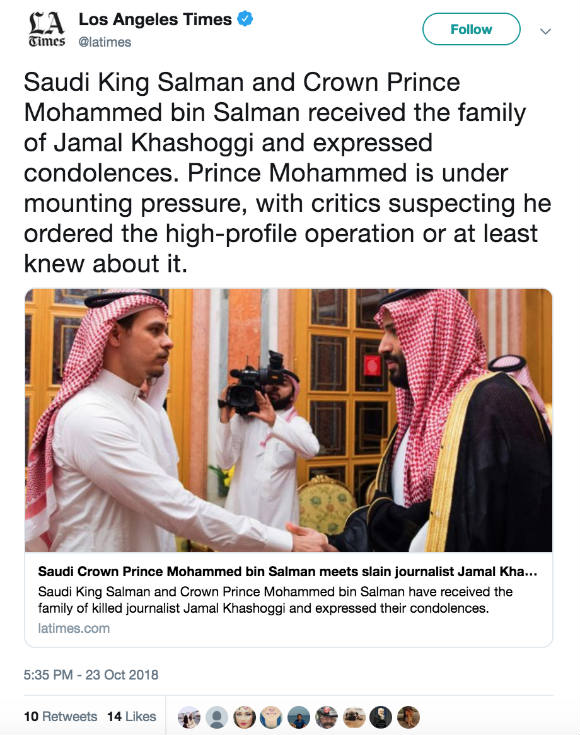
Josh Rogin: Here’s how Crown Prince Mohammed could face international justice.
Former Secretary of State James A. Baker III: “Partner or not, if it is established that the Saudi government arranged a murder, the Trump administration should provide a swift, firm and substantial response that makes it clear that the United States condemns behavior of this sort.”
***
➜ WHITE HOUSE & ADMINISTRATION: Trump will meet Russian President Vladimir Putin in Paris just days after the U.S. midterm elections, on the sidelines of a planned ceremony in France marking the 100th anniversary of the end of World War I.
White House national security adviser John Bolton, conferring with Russian officials in Moscow, announced the Trump-Putin meeting, which will be the two leaders’ second extended sit-down since July (The Washington Post).
Separately, Trump will meet Chinese President Xi Jinping to discuss trade on the sidelines of the Group of 20 nations summit in Buenos Aires, Argentina, scheduled Nov. 30-Dec. 1, White House national economic adviser Larry Kudlow said on Tuesday.
Kudlow said he did not expect a major breakthrough with China while the two presidents are in Argentina (Bloomberg).
More tax cuts?: Trump stirred confusion on Tuesday with his pre-elections cheerleading for a second round of GOP tax cuts. Kudlow told reporters the president is serious about reducing taxes but cautioned it would not happen for “a while.”
Congress is not in session until mid-November, and a post-elections legislative session in December is already jammed with unfinished business and political suspense about 2019.
Trump this week said he wants Republican lawmakers to send him new legislation to trim middle-income families’ taxes by 10 percent. The pitch from the president is widely perceived as a tacit acknowledgement that the 2017 tax overhaul was less popular among middle-class families than Republicans had hoped during this election season (Bloomberg).
On Tuesday, the president said he’d sign a nonbinding “resolution” promising that Congress would deliver another 10 percent cut to families after the elections, a pledge that sent the White House scrambling to devise a way to fulfill Trump’s improvised remark (The Washington Post).
Immigration: The president’s threat to cut off U.S. assistance to Guatemala, Honduras and El Salvador because migrants from those countries are fleeing north through Mexico toward the United States earned a chilly rebuke from Florida Republican Sen. Marco Rubio on Tuesday.
The senator said U.S. foreign aid to Central American countries is not charity.
“I understand [the] instinct to cut U.S. aid to punish countries for failing to stop illegal migration. But our aid to #Honduras & #Guatemala isn’t cash,” Rubio wrote on Twitter. “It’s primarily equipment & training to stop drugs headed to U.S. & to deal with the gangs causing people to leave those countries” (The Hill).
The 7,000-member migrant caravan slowly moving through Mexico has agitated Trump, who tells U.S. audiences that the United States is under assault from law-breakers, MS-13 gang members and what he asserts without evidence are Middle Eastern terrorists trying to slip into the United States. The caravan remains more than 1,000 miles from America’s southern border.
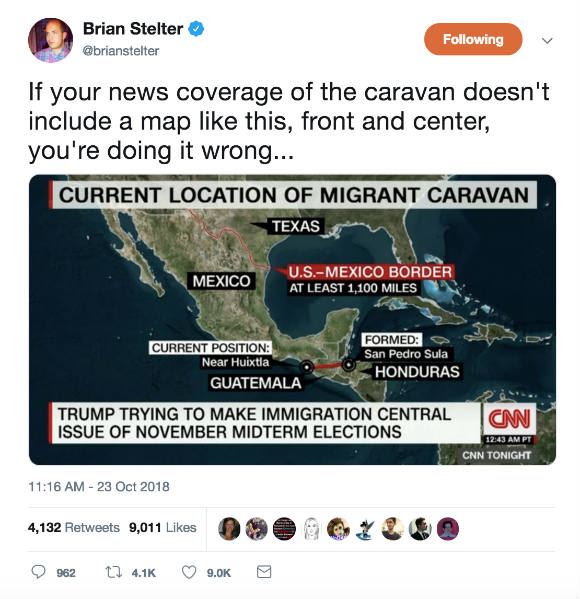
The administration would like Central American migrant families to be stripped of the right to remain in the United States while they pursue asylum claims, a senior administration official told reporters on Tuesday. Under current law, however, only nationals from contiguous countries, such as Mexico, are sent back across the border without appearing before an immigration judge (NBC News).
Trump is frustrated that his policies designed to deter illegal immigration across the U.S.-Mexico border have had less impact than he’d like among migrants who continue to seek entry into the United States.
The U.S. Border Patrol apprehended nearly 400,000 people crossing the southern border in fiscal 2018, up roughly 100,000 from the prior year. But following a significant dip after Trump took office last year, border crossings largely returned to their seasonal patterns measured during the previous five years (The Hill).

The Morning Report is created by journalists Jonathan Easley jeasley@digital-staging.thehill.com & Alexis Simendinger asimendinger@digital-staging.thehill.com. Suggestions? Tips? We want to hear from you! Share The Hill’s reporting and newsletters, and encourage others to SUBSCRIBE!
OPINION
Is Vladimir Putin losing steam?, by Michael Dempsey, former acting director of national Intelligence and opinion contributor for The Hill. http://bit.ly/2EDLN9p
Killing our nuke treaty with Russia is common sense, by Rich Lowry, New York Post. https://nyp.st/2R8ehK3
WHERE AND WHEN
The House and Senate will convene after Election Day. The Senate Judiciary Committee holds a 10 a.m. hearing to consider two nominations to the U.S. Court of Appeals for the 9th Circuit (Eric Miller in Washington and Bridget Bade in Arizona).
The president this afternoon delivers a speech about the opioid crisis and what he calls “historic progress.” Trump travels to Mosinee, Wis., in the evening for a rally and returns to Washington tonight.
Pence will be in Scranton and Lancaster, Pa., and Virginia Beach, Va., to campaign for GOP candidates.
Treasury Department Assistant Secretary Marshall Billingslea speaks at 11 a.m. at The Brookings Institution about financial tools for U.S. policy toward Nicaragua and Venezuela.
SPONSORED CONTENT – PHRMA
PhRMA members take new approach to DTC TV advertising
Soon, TV ads for our medicines will direct you to information including the list price of the medicine, out-of-pocket costs or other context about the potential cost of the medicine and available financial assistance. It’s our mission to find lifesaving treatments. It’s our responsibility to help patients access them. Learn more.
ELSEWHERE
> Lobbying: E-cigarette maker Juul boosts its spending on lobbying by 452 percent amid federal regulatory crackdown (CNBC).
> Tech jobs: In a competitive economy, the tech industry has encountered an informal boycott among some talented potential employees because companies contract with the U.S. military, intelligence and law enforcement (The Hill).
> War: A U.S. Army report about the war in Iraq has been hidden from view since 2016 (The Wall Street Journal).
> Catholic Church: The U.S. Attorney’s Office for the District of Columbia has opened a civil investigation into the Catholic Archdiocese of Washington over clergy sexual abuse.
There are now 14 states and territories with open investigations involving the Catholic Church (WTOP).
> Freed journalist: Japan confirmed that a man freed from Syria on Tuesday is a Japanese freelance journalist, Jumpei Yasuda, kidnapped three years ago (The New York Times).
> Mega Millions Jackpot: In South Carolina, a single winner has the lucky ticket with the numbers 5, 28, 62, 65, and 70, with a Mega Ball of 5, altering the course of his or her life (NBC News). The winning $1.6 billion jackpot was the largest in U.S. history. Don’t forget: A Powerball lottery drawing worth $354 million takes place tonight.
THE CLOSER
And finally … The World Series got underway last night, with the Boston Red Sox topping the Los Angeles Dodgers to take a 1-0 series lead (The New York Times has a fun read on how it covered the 1916 World Series the last time these two teams met.)
That means it’s time for politicians and government officials to put their money where their mouths are.
This year we’ve got some Democrat-on-Democrat action between Reps. Adam Schiff (Los Angeles) and Joe Kennedy III (Boston).
If the Dodgers win, Kennedy owes Schiff a shellfish dinner, fresh from the harbor. If the Red Sox win, Schiff will have to pony up with some California sushi.
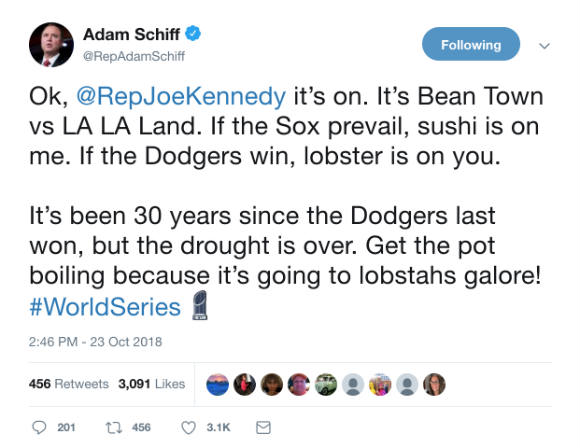
The local police departments are getting in on the action as well.
Los Angeles Police Chief Michel Moore has wagered some of Langer’s world-famous pastrami sandwiches against lobsters from Boston Police Department Commissioner William Gross.
Boston Mayor Martin Walsh is having none of it, saying a three game losing streak dating back to his inauguration has convinced him to stop betting (CBS).
The Dodgers were also in the World Series last year. For that Fall Classic,
California Gov. Jerry Brown (D) put up some bottles of California wine against Texas Gov. Greg Abbott’s local barbecue and beer.
The Houston Astros triumphed in seven games, leaving Brown to make a nice donation to Abbott’s wine cellar.
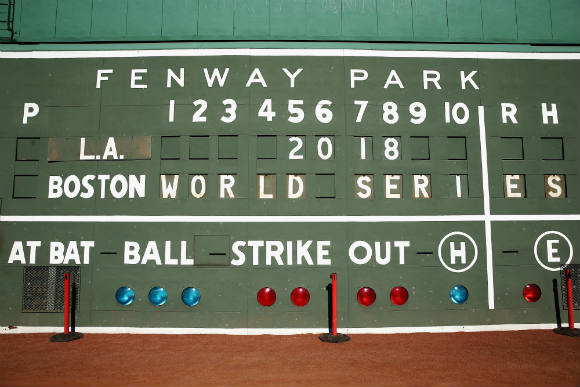
Copyright 2024 Nexstar Media Inc. All rights reserved. This material may not be published, broadcast, rewritten, or redistributed..














